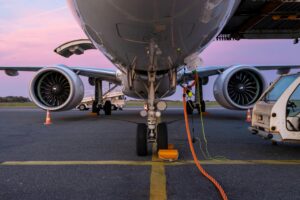Nigeria’s aviation sector stands at a critical crossroads. Foreign airlines have over $600 million in trapped funds they cannot repatriate, forcing carriers to limit operations or withdraw entirely from the country. Meanwhile, the government pushes forward with a controversial national carrier initiative, echoing past failed attempts. This contradictory approach threatens to undermine the entire aviation ecosystem at a time when Nigeria can least afford further economic isolation.
The blocked funds crisis represents more than just an accounting problem. It strikes at the heart of Nigeria’s credibility as an investment destination.
The Blocked Funds Crisis
Foreign airlines operating in Nigeria sell tickets in naira but need to convert these earnings to dollars to pay for aircraft leases, maintenance, insurance, and other international obligations. For years, they’ve faced increasing difficulties accessing their funds due to Nigeria’s forex scarcity.
The International Air Transport Association (IATA) has repeatedly warned about the consequences of this situation. Several airlines have already reduced capacity, while others have suspended routes entirely. Emirates Airlines, which completely withdrew from the Nigerian market, cited the inability to repatriate approximately $85 million in trapped funds as the primary reason.
The damage extends far beyond the immediate operational challenges for airlines. As Sindy Foster, Principal Managing Partner, Avaero Capital Partners notes, “Foreign airlines are investors too… After they have incurred costs and sold their product, they are unable to access their funds. This should send alarm bells to any foreign investor considering Nigeria.”
This perception problem compounds Nigeria’s already challenging investment climate. When a government fails to honor basic business agreements with international airlines, other potential investors naturally question whether their investments would face similar obstacles.
Who Bears Responsibility?
While fingers point toward the Ministry of Aviation, the Central Bank of Nigeria shoulders significant responsibility for the forex allocation policies creating this bottleneck. However, the aviation authorities cannot escape accountability entirely.
The ministry has failed to effectively advocate for the strategic use of Bilateral Air Service Agreement (BASA) funds—dollar payments that foreign carriers make to Nigeria for route rights—to alleviate the crisis. These funds could provide a partial solution if properly directed toward sustaining critical aviation infrastructure and services.
The consequences for Nigerian travelers are already severe. With reduced capacity and fewer competing airlines, ticket prices have skyrocketed. If additional carriers follow Emirates’ example, industry experts warn of a “catastrophe for passengers” with even fewer options and higher fares.
The National Carrier Contradiction
Against this backdrop of forex scarcity and airline withdrawals, the government paradoxically pushes forward with plans to launch a new national carrier—Nigeria Air. This initiative appears disconnected from market realities and the immediate challenges facing the sector.
Nigeria’s history with national carriers offers cautionary lessons. Virgin Nigeria, which replaced the defunct Nigeria Airways in 2004 as a joint venture between Nigerian investors and the Virgin Group, collapsed by 2012 after multiple name changes and ownership struggles.
“We would need to ask ourselves what really has changed in terms of psychology, behaviour and attitude to lead to a different outcome this time,” notes Sindy Foster.
The government initially promised the new national carrier would operate as a public-private partnership with minimal (5%) government ownership. Yet as launch approaches, this minority shareholder has made “100% of the decisions and 100% of the investment,” with no transparency about the remaining ownership structure.
While 27 foreign airlines currently serve Nigeria, only one Nigerian carrier—Air Peace—flies internationally, serving eight countries. Some industry experts suggest that designating flag carrier status to existing private airlines with demonstrated capacity would make more sense than creating a new entity from scratch.
Market Distortion Concerns
The planned national carrier threatens to distort an already struggling market. Rather than increasing overall capacity, it may simply displace existing domestic carriers that cannot compete with a government-backed entity likely to receive preferential treatment for fuel allocation, forex access, and regulatory approvals.
“The three aircraft which the national carrier are bringing can easily displace 10 aircraft of airlines who are currently struggling,” warns an industry analyst. “When supply retracts, prices will go up.”
This outcome would directly contradict the stated goals of reducing fares and increasing options for Nigerian travelers.
BASA Implementation Gap
Nigeria has signed over 95 Bilateral Air Service Agreements with countries worldwide, yet utilizes only a fraction of these opportunities. The new national carrier won’t address this imbalance anytime soon—it plans to focus on domestic routes for its first two years, competing directly with existing Nigerian airlines rather than expanding the country’s international footprint.
This approach fails to address the fundamental asymmetry in Nigeria’s international aviation relationships: foreign carriers dominate routes to and from Nigeria while capturing most of the revenue.
A Better Path Forward
Industry stakeholders suggest the government should pause the national carrier launch and focus instead on stabilizing the existing aviation ecosystem.
Priority actions should include:
1. Resolving the blocked funds crisis through a clear payment schedule that restores airline confidence
2. Directing BASA funds toward supporting viable existing carriers with international ambitions
3. Addressing structural cost challenges through local refining of aviation fuel
4. Creating a more competitive operating environment by reducing taxes and fees that make Nigerian aviation among the world’s most expensive
5. Establishing transparent forex allocation mechanisms that prioritize critical sectors like aviation
The current approach risks further isolating Nigeria from global aviation networks at a time when connectivity is essential for economic development. As Sindy Foster bluntly states: “What the industry needs now is focused attention to find solutions. The cost structure needs to be overhauled across the board.”
For Nigerian authorities, the choice is clear but challenging: address the fundamental problems driving airlines away before launching a new carrier into a dysfunctional market. The alternative—continuing on the current path—threatens to leave Nigeria with fewer international connections, higher fares, and another failed national carrier experiment.
Nigeria’s aviation potential remains substantial, with one of Africa’s largest populations and a significant diaspora. Realizing this potential, however, requires policy coherence and market credibility that current approaches have yet to demonstrate.
Disclaimer: The insights shared in this article are for information purposes only and do not constitute strategic advice. Aviation markets and circumstances vary, and decisions should be based on your organisation’s specific context. For tailored consultancy and guidance, please contact info@avaerocapital.com.




